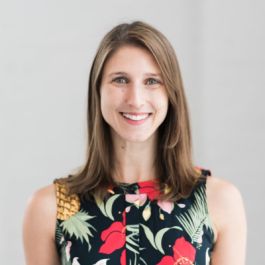Melissa Estevez remembers those career-changing conversations she had as a life sciences consultant. The discussions she had with physicians were especially pivotal for one main reason: each one highlighted the need for real-world evidence to address gaps in clinical trial data.
“This experience sparked my passion for the impact of real-world evidence in identifying unmet needs, characterizing the standard of care and understanding how patients respond to existing therapies — particularly those patients who are not eligible for clinical trials,” Estevez said.
Fueled by this passion, she eventually found herself at Flatiron Health, where she currently works as a senior research scientist, helming efforts to improve the cancer patient journey through the use of AI and machine learning. Since joining the healthtech company, Estevez shared, she has witnessed the “transformative power of real-world evidence” in various forms.
Carving Out a Better Future for Cancer Treatment
Flatiron Health, an independent affiliate of the Roche Group, is a healthtech company expanding the possibilities for point-of-care solutions in oncology and using data for good to power smarter care for every person with cancer. Through machine learning and AI, real-world evidence and breakthroughs in clinical trials, the company continues to transform patients’ real-life experiences into knowledge and create a more modern, connected oncology ecosystem.
And as the company has evolved the cancer treatment space over the years, her career has grown as well. Besides changing roles multiple times, Estevez moved from New York City to Raleigh, North Carolina, a few years ago, putting her in close proximity to the company’s newly opened Life Sciences Hub in neighboring Durham.
She believes this prime location will be key to the company’s continued success, offering close access to the type of people who can apply the right expertise to complex issues.
“Now, as Flatiron’s real-world evidence business evolves from being a company that primarily produces data to one that delivers a full set of services, including evidence and insights, I couldn’t think of a better place to be than the Research Triangle, where we have access to a rich and diverse talent pool,” Estevez said.
According to her, this progress hinges on a flexible, hybrid culture that enables her and other working parents to balance bedtime rituals with the demands of a critical, growing sector. But ultimately, it all boils down to the nature of the organization itself.
“Flatiron Health is unique as a healthtech company because we cover the whole process of real-world evidence generation, from data entry at the point of care to curating real-world data and finally analyzing it,” Estevez shared. “I can’t stress enough how unique and powerful this is.”
Below, Estevez shares more about the work she and her peers accomplish at the company’s Life Sciences Hub, how the culture enables them to achieve this and what sets the organization apart from others in its industry.
Research sciences is a functional team with expertise in epidemiology and biostatistics. In our day-to-day, we sit across various project teams throughout the business. I work with internally facing teams applying artificial Intelligence and machine learning to extract data elements from unstructured electronic health records. Using AI to curate that EHR data at scale allows us to unlock solutions with larger cohort sizes and coverage across the entire patient journey. The research sciences team plays a vital role in characterizing the fit for data extracted using AI.
“Using AI to curate data at scale allows us to unlock solutions with larger cohort sizes and coverage across the entire patient journey. The research sciences team plays a vital role in this.”
Many of my colleagues in research sciences are aligned with the customer-facing teams that build and deliver solutions — data and analyses — to our customers. Through this collaboration, we have defined new roles within research sciences, including statistical programmers who bring expertise in our data along with technical and coding skills and research scientists who bring expertise in our data and real-world evidence methodologies. By each bringing deep expertise in different areas of the project, these roles can collaborate to generate real-world evidence at a grander scale and efficiency.
Describe the importance and impact of cross-functional collaboration in your role.
Cross-functional collaboration is absolutely vital in my daily work at Flatiron Health. Machine learning data scientists build AI algorithms that extract data elements from the EHR. Understanding from them how our models work allows me to best validate the data they produce. Oncologists play a key role in ensuring that data models, AI algorithms and patient cohorts are designed in a manner that is closely aligned with real-world clinical practice. Product managers are instrumental in setting the vision for the product, prioritizing tasks according to long-term product roadmaps and driving progress within tight deadlines. Clinical data experts support the development of new variables and drive data quality activities.
These are just a few examples. Our work is highly complex and we often need to make decisions and weigh tradeoffs quickly. Working efficiently and cross-functionally allows us to move quickly while still considering all perspectives in our decision making.
I’ve witnessed firsthand the transformative power of our real-world evidence, such as supporting label expansions for treatments like palbociclib in men with breast cancer. Getting to this result involved a massive cross-functional effort, and it was powerful to see the impact all that work had on patients’ access to valuable treatment.
Mission-Driven Work
According to Estevez, the Life Sciences Hub contributes to Flatiron Health’s mission in two key ways: access to talent and fostering collaboration. Not only is the new office closer to some of the brightest minds in the industry, but it centralizes teams, therefore facilitating knowledge-sharing and learning.
“Since the hub’s opening this spring, I have already connected with new colleagues, including those in our clinical research business unit, allowing me to expand my understanding of other parts of Flatiron Health’s business,” Estevez said.
Shat sets Flatiron Health apart from other healthtech companies in the cancer care space?
At the point of data entry, designing our own oncology-specific EHR means that we can make changes to the EHR that improve workflows for oncologists and increase the utility of data collected for research.
For example, when new molecular markers become standard to test for as part of routine care, we can update the EHR to collect that information in a structured way, making that information more easily accessible. Then, as we develop real-world data models and curation approaches, we become deep experts in our data. This allows us to bring a wealth of experience and methods to analyze real-world data to generate real-world evidence.
The second thing that makes Flatiron unique is the quality of our people and our science. Not only do I work with some of the kindest and most collaborative people I have ever encountered in my career, but everyone brings a high level of competence to their respective fields. When combined, collaboration and domain expertise allow us to produce high-quality science and solutions.
In the past year, I have attended several conferences. Attending workshops and sessions led by my peers, I always leave feeling impressed with our ability to leverage novel methods and develop creative solutions to our work.
How does Flatiron Health’s culture affect your work?
I am one of many working parents at Flatiron, with three kids ages four and under. Flatiron Health provides flexibility for employees to set their own schedules. This allows me to start my day earlier than most of my peers and block my calendar during school pickup. My team accommodates by scheduling meetings within my designated working hours. This alone has such a positive impact on my quality of life. I can fully engage in my career at Flatiron Health without missing out on the quality time I get with my children between school pickup and bedtime.
My team in the Raleigh-Durham office can look forward to the same culture, as I will encourage everyone to choose which days and hours they come into the office to achieve their unique version of work-life balance.







